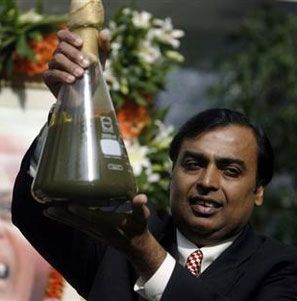That a criminal case was filed against Reliance Industries Ltd (RIL) chief Mukesh Ambani and Petroleum Minister Veerappa Moily has led to doubt on whether the recent notification of gas pricing guidelines will be implemented from April 1. However, analysts do not seem concerned about the issue — in the quarter ended December 2013, oil and gas contributed only one per cent to the company’s revenue. Nitin Tiwari of Religare Capital Markets says if the gas price rise isn’t implemented, RIL’s fair value will see an impact of just Rs 5-10 a share. During the quarter ended December 2013, exploration & production (E&P) business revenue stood at Rs 1,733 crore (Rs 17.33 billion), merely 1.5 per cent of the gross revenue of Rs 1,22,654 crore (Rs 1,226.54 billion).
Nitin Tiwari of Religare Capital Markets says if the gas price rise isn’t implemented, RIL’s fair value will see an impact of just Rs 5-10 a share. During the quarter ended December 2013, exploration & production (E&P) business revenue stood at Rs 1,733 crore (Rs 17.33 billion), merely 1.5 per cent of the gross revenue of Rs 1,22,654 crore (Rs 1,226.54 billion).
The segment contributed less than five per cent at the level of earnings before interest and tax. Therefore, though there might be some sentimental and earnings impact of the Aam Aadmi Party’s action against gas price rises, it won’t be substantial.
Macquaire Equities Research says the KG-D6 block has been RIL’s biggest cause of pessimism, owing to regulatory issues involved. However, in a report released on Monday, it saw upstream concerns abating with clarity on regulatory issues. Concerns are falling volumes are greater.
“The KG-D6 block (D1-D3 and MA fields) was supposed to have scaled up to a volume of 80 mscmd (million standard cubic metres a day) by now. But currently, production is languishing at 12 mscmd. RIL has cited geological difficulties at D1-D3 which have isolated a significant part of the reserves in the block, leading to a sharp cut in reserves. Currently, workovers and an additional well drilled at the MA field have shown signs of a revival at KG-D6 for the first time in three years,” it said in the report.
Sachin Mehta, analyst at Centrum Broking, says until the Supreme Court intervenes and gives guidelines to the government to stop the implementation of the gas price rise, the government won’t reconsider its decision.
On how companies in the gas production space would be impacted, Mehta said if the decision to raise gas prices was deferred or rolled back, ONGC (which currently produces about 64 mscmd) would be hit more compared to RIL (which produces 13-14 mscmd).
For RIL, the major hangover that led to pressure on the stock price was its participation in the telecom spectrum auction, feels Nitin Tiwari. Since mid-January, the stock has corrected nine per cent, closing at Rs 821.5 on the BSE on Friday. Investments in the telecom business will yield results over a period of time. The venture is likely to take three-four years to break-even. Therefore, investment in the segment will continue diluting gains from the petrochemical segment, feel analysts.
The impact will be more pronounced if the gas price rise is deferred for long. It is likely gas production will marginally increase to 15 mscmd in FY15, followed by another marginal increase in FY16. A substantial jump in output is expected only after FY17. Therefore, analysts say while the earnings per share will be impacted by Rs 2-3 in FY15 and FY16, the earnings per share could be significant thereafter, if there are no price increases. For FY15 and FY16, the earnings-per-share estimates stand at Rs 71.70 and Rs 85.70, respectively, according to Nomura estimates.











 © 2025
© 2025